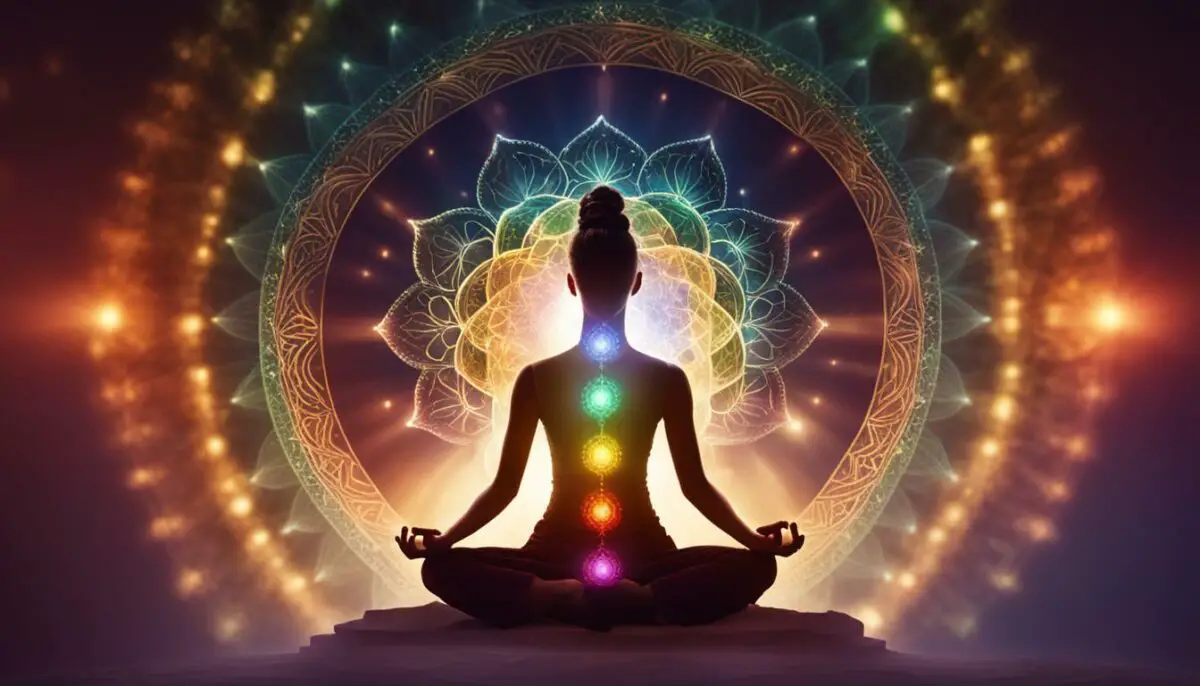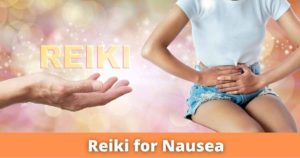Are you seeking a holistic approach to self-care that promotes relaxation, stress reduction, and emotional healing? Look no further than Reiki self-healing methods. Reiki is a Japanese healing technique that focuses on balancing the mind, body, and spirit by harnessing the universal life energy that flows through all living things.
Using Reiki healing techniques, you can tap into this energy to manage stress, improve well-being, alleviate pain, and promote emotional healing. It is a non-invasive and gentle practice that can be easily incorporated into your self-care routine alongside other practices like meditation and yoga.
Key Takeaways
- Reiki self-healing methods offer a holistic approach to self-care
- Reiki can be used to manage stress, improve well-being, alleviate pain, and promote emotional healing
- Reiki is a non-invasive and gentle technique that can complement other self-care practices
- Regular Reiki sessions can enhance meditation and yoga practices, deepen relaxation, and promote mental clarity
- Reiki is a safe and effective tool for self-care

What Is Reiki and How Does It Work?
Reiki is a Japanese healing technique that focuses on balancing the mind, body, and spirit by harnessing the universal life energy that flows through all living things. It is a holistic approach to self-care that promotes relaxation and stress reduction, making it an ideal practice for those looking to manage stress, improve well-being, alleviate pain, and promote emotional healing. Reiki is a non-invasive technique that can complement other self-care practices such as meditation and yoga.
The word “Reiki” is derived from two Japanese words, “rei” meaning universal and “ki” meaning life energy. During a Reiki session, practitioners use their hands to transfer energy to the recipient, promoting the activation of the body’s natural healing processes. This gentle and non-invasive technique helps manage stress, improve overall well-being, alleviate physical pain, and promote emotional healing.
Reiki can be used as a self-care practice alongside other techniques like meditation and yoga. By incorporating Reiki into a daily routine, individuals can experience the benefits of relaxation, stress reduction, and enhanced overall well-being. It is a safe and effective tool for self-care that promotes the harmony of mind, body, and spirit.
The Benefits of Reiki Self-Healing
Reiki self-healing offers several benefits for individuals seeking relaxation, stress reduction, physical pain relief, and emotional healing. Reiki is a non-invasive and gentle healing technique that can be a great complement to other self-care practices. It promotes relaxation, reduces stress, improves overall well-being, and helps release emotional blockages. Regular Reiki sessions can enhance meditation and yoga practices, deepen relaxation, and promote mental clarity. Reiki is a safe and effective tool for self-care.
One of the key benefits of Reiki self-healing is its ability to promote relaxation and reduce stress. Through the gentle touch and energy transfer, Reiki helps calm the nervous system and induces a deep state of relaxation. This can be especially beneficial for individuals who experience chronic stress or anxiety. Reiki also helps release tension in the body, promoting physical relaxation and a sense of ease.
Reiki self-healing is a gentle and non-invasive technique that can help alleviate physical pain and discomfort. By balancing the body’s energy and promoting its natural healing abilities, Reiki can provide relief from conditions such as headaches, muscle tension, and chronic pain. It can also support the healing process after surgeries or injuries.
Emotional healing is another significant benefit of Reiki self-healing. By releasing emotional blockages and promoting the flow of energy, Reiki helps individuals process and heal from past traumas, grief, or emotional pain. It can create a safe space for emotional release and provide support during challenging times. Reiki self-healing can also foster a sense of inner peace, self-awareness, and personal growth.
Table: The Benefits of Reiki Self-Healing
| Benefits | Description |
|---|---|
| Relaxation and Stress Reduction | Reiki promotes deep relaxation, calms the nervous system, and reduces stress levels. |
| Physical Pain Relief | Reiki can alleviate physical pain, including headaches, muscle tension, and chronic pain conditions. |
| Emotional Healing | Reiki helps release emotional blockages, heal past traumas, and promote a sense of inner peace. |
| Complement to Self-Care Practices | Reiki self-healing can enhance other self-care practices such as meditation and yoga. |
Overall, Reiki self-healing is a gentle and effective practice that offers numerous benefits for individuals seeking relaxation, stress reduction, physical pain relief, and emotional healing. By incorporating Reiki into their self-care routine, individuals can experience enhanced well-being and a deeper connection to their mind, body, and spirit.
Reiki and Mindfulness
Reiki can be a powerful tool for promoting mindfulness, the practice of paying attention to the present moment without judgment. By combining Reiki with mindfulness techniques, individuals can enhance their self-care practices and cultivate a deeper sense of relaxation and inner peace.
During a Reiki session, both the practitioner and recipient are encouraged to be fully present and focused. The gentle touch and energy flow promote a state of calmness and relaxation, allowing individuals to let go of stress and worries. This heightened state of awareness can help quiet the mind and promote a sense of tranquility.
“Reiki helps me bring my attention to the present moment. As the energy flows through my body, I feel a sense of calmness and clarity. It’s like my worries melt away, and I’m able to fully embrace the present moment.” – Reiki recipient
By combining Reiki with mindfulness practices such as deep breathing and meditation, individuals can deepen their self-awareness and promote a sense of inner peace. Reiki can serve as a gentle reminder to be non-judgmental towards oneself and others, fostering a mindset of acceptance and compassion.
Reiki and the Present Moment
Reiki sessions can serve as a dedicated time to practice mindfulness and be fully present in the moment. The gentle energy flow during a session can help individuals anchor their attention to their breath and bodily sensations, creating a profound sense of grounding and presence.
| The Benefits of Reiki and Mindfulness | Reiki Techniques for Mindfulness |
|---|---|
|
|
Reiki and Emotional Healing
Reiki is a powerful practice that can facilitate emotional healing by helping individuals release trauma and promote overall well-being. Many people carry emotional pain and trauma, which can manifest as physical symptoms like chronic pain or illness. Through a Reiki session, the energy transferred can penetrate deep into the emotional blockages, promoting healing on a profound level.
By incorporating Reiki into a self-care routine, individuals can find relief from emotional pain and support their healing journey. Reiki works by promoting balance and activating the body’s natural healing processes, allowing for the release of emotional burdens. Regular Reiki sessions can help individuals manage and overcome emotional challenges, leading to a greater sense of peace and well-being.
Whether you are dealing with past traumas, emotional imbalances, or simply seeking emotional healing, Reiki is a safe and effective tool. By promoting healing from within, Reiki can address the root causes of emotional pain and help individuals find the peace and emotional well-being they seek. Incorporating Reiki into your self-care practices can have profound benefits for promoting emotional healing and overall well-being.
Reiki and Trauma Release
One of the powerful aspects of Reiki is its ability to assist in the release of trauma. Traumatic experiences can leave energetic imprints in the body, which can contribute to emotional and physical pain. Reiki can help individuals release these energetic imprints, promoting healing and restoring emotional balance.
“Reiki helped me tremendously in releasing emotional trauma that I had been carrying for years. The gentle energy flow during a Reiki session allowed me to let go of emotional burdens and find a renewed sense of peace within myself.” – Sarah, Reiki recipient
| Reiki and Emotional Healing | Benefits |
|---|---|
| Promotes release of emotional trauma | Allows for emotional healing on a deep level |
| Supports emotional well-being | Helps manage and overcome emotional challenges |
| Restores balance and promotes peace | Enhances overall emotional well-being |
Incorporating Reiki into your self-care practices can be a transformative experience, allowing you to release emotional trauma and promote healing on all levels. Whether you have experienced trauma or simply wish to enhance your emotional well-being, Reiki can support you on your healing journey.
Reiki and Better Sleep
Getting a good night’s sleep is essential for our overall well-being. However, many of us struggle with sleep issues due to stress, anxiety, or other factors. Reiki, with its focus on relaxation and stress reduction, can be a wonderful addition to your self-care practices to promote better sleep quality.
Through the gentle energy transfer of Reiki, individuals may find it easier to fall asleep and stay asleep. The deep relaxation achieved during a Reiki session can calm the mind and release tension, allowing for a more restful sleep experience. By incorporating Reiki into your self-care routine, you can create a peaceful and serene environment that promotes a rejuvenating night’s sleep.
Reiki’s ability to reduce stress can also have a positive impact on sleep. Stress often keeps us awake at night, preventing us from falling asleep or causing us to wake up frequently. By practicing Reiki and reducing stress levels, you can create a calmer state of mind and promote better sleep hygiene.
Reiki and Better Sleep Strategies:
- Practice Reiki self-healing techniques before bed to promote relaxation and prepare your body for sleep.
- Create a soothing environment in your bedroom with calming scents, soft lighting, and comfortable bedding.
- Engage in mindfulness exercises, such as deep breathing or meditation, to calm your mind before sleep.
- Avoid stimulating activities or electronics before bed to promote a more peaceful transition into sleep.
By incorporating Reiki and implementing these strategies into your self-care routine, you can improve your sleep quality and wake up feeling refreshed and rejuvenated.
Reiki and Spiritual Growth
Reiki is not only a powerful tool for physical and emotional healing but also an effective way to support spiritual growth and self-awareness. During a Reiki session, individuals are encouraged to connect with their inner selves and cultivate a greater sense of purpose and meaning in life. Through the gentle energy transfer, Reiki promotes deep inner peace and a profound connection to something greater than oneself.
By incorporating Reiki into a self-care routine, individuals can embark on a journey of spiritual exploration and personal growth. Reiki sessions can help quiet the mind, reduce stress, and enhance relaxation, making it easier to attain a state of mindfulness and self-awareness. This heightened awareness allows individuals to tap into their inner selves, gain clarity, and deepen their understanding of their purpose and life’s meaning.
Engaging in regular Reiki sessions and practicing self-care through Reiki can open doors to spiritual growth. It provides a safe and nurturing space for individuals to explore their spirituality and develop a stronger connection with their inner selves. The gentle energy flow experienced during a Reiki session creates a conducive environment for self-reflection, self-discovery, and personal transformation.
Reiki and Inner Self
Reiki facilitates a profound connection with the inner self, allowing individuals to develop a deeper understanding of their own needs, desires, and aspirations. This process of self-discovery and self-connection can lead to a greater sense of fulfillment, happiness, and overall well-being. By nurturing the inner self through Reiki, individuals can cultivate a stronger relationship with themselves, fostering self-love, self-acceptance, and self-compassion.
| Benefits of Reiki for Spiritual Growth |
|---|
| Enhances self-awareness and self-discovery |
| Deepens connection with inner self |
| Facilitates clarity and understanding of life’s purpose |
| Promotes spiritual exploration and personal growth |
| Fosters self-love, self-acceptance, and self-compassion |
Incorporating Reiki into a self-care routine can provide individuals with the tools and support they need for their spiritual journey. Whether it’s through regular Reiki sessions or practicing self-Reiki, individuals can experience profound spiritual growth, gain clarity, and find a deeper sense of purpose and meaning in life.
Reiki for Physical Healing
Reiki is a powerful self-care practice that can promote physical healing and overall well-being. By incorporating Reiki into your daily routine, you can experience relaxation, stress reduction, and pain relief. The gentle touch and energy transfer during a Reiki session activate your body’s natural healing processes, supporting your body’s ability to heal itself.
Through Reiki, you can alleviate physical pain, reduce stress levels, and promote a sense of calmness and relaxation. The energy flow during a Reiki session helps to balance your body’s energy, promoting physical healing from within. Regular practice of Reiki self-healing can enhance your self-care routine and promote overall well-being.
By engaging in Reiki self-healing, you can take an active role in your own physical well-being. By incorporating Reiki hand positions and daily self-practice, you can tap into the healing energy within you and promote your body’s self-healing response. Whether you’re managing chronic pain, recovering from an injury, or simply seeking to enhance your overall health, Reiki can be a valuable tool for physical healing and pain relief.
Reiki Hand Positions for Self-Healing
Practicing Reiki self-healing involves using specific hand positions to promote relaxation, reduce anxiety, and enhance overall well-being. These hand positions are designed to channel the healing energy of Reiki to different parts of the body, allowing for a deep sense of calmness, mental clarity, and self-awareness. By incorporating these hand positions into your self-care practices, you can experience the benefits of Reiki in your daily life.
One popular hand position is the “Gassho” position, where the palms are placed together in front of the heart. This position helps to calm the mind, reduce stress, and promote a sense of inner peace. Another hand position is the “Hatsurei Ho” position, where the hands are held slightly apart with the palms facing each other. This position is believed to activate the flow of Reiki energy and enhance self-healing capabilities.
Other hand positions include placing the hands on specific areas of the body, such as the head, the heart, the stomach, or the lower back. Each position serves a specific purpose in promoting relaxation, reducing anxiety, and promoting self-awareness. It is recommended to spend a few minutes in each hand position, allowing the healing energy to flow through your hands and into your body.
By incorporating these Reiki hand positions into your self-care routine, you can experience the power of self-healing and promote a sense of calmness, mental clarity, and overall well-being. Whether you are new to Reiki or have been practicing for a while, these hand positions can enhance your self-care practices and support your journey towards inner peace and self-discovery.
The Power of Daily Reiki Self-Practice
Incorporating daily Reiki self-practice into your routine can have a transformative impact on your well-being. By engaging in this practice, you allow the energy flow within your body to balance and activate your self-healing response. This, in turn, enables you to effectively manage mental and emotional stressors, promoting a greater sense of calm and serenity in your daily life.
Reiki self-practice is a form of self-care that empowers you to take charge of your own well-being. By dedicating time each day to connect with your inner healing energy, you cultivate a deeper sense of self-awareness and promote your own personal growth. This practice can also help you manage stress, providing you with a powerful tool to navigate the challenges of daily life.
One of the key benefits of daily Reiki self-practice is its ability to improve your overall well-being. Regular engagement with this healing technique allows you to tap into your body’s innate wisdom and support its natural healing processes. By promoting relaxation, reducing stress, and fostering a deep sense of inner peace, daily Reiki self-practice can significantly enhance your physical, mental, and emotional well-being.
To make the most of your daily Reiki self-practice, create a peaceful space where you can comfortably sit or lie down. Close your eyes, take deep breaths, and allow yourself to fully relax. Place your hands on different parts of your body, focusing on areas that feel tense or imbalanced. As you do so, visualize the energy flowing through your hands, bringing healing and balance to those areas. Maintain this practice regularly to experience the profound benefits it can bring to your life.
Conclusion
Reiki self-healing methods provide a comprehensive approach to self-care, promoting relaxation, stress reduction, emotional healing, better sleep, spiritual growth, and physical healing. Incorporating Reiki hand positions and daily self-practice into your routine can greatly enhance your overall well-being and support your self-care journey.
Reiki is a safe, non-invasive, and gentle technique that can complement other self-care practices, allowing you to experience a deep sense of inner peace and serenity. By harnessing the power of Reiki Self-Healing Methods, you can find solace and rejuvenation amidst the demands of daily life.
Take the time to explore the different Reiki hand positions and incorporate them into your self-care practices. Whether you are seeking relaxation, stress reduction, emotional healing, better sleep, spiritual growth, or physical healing, Reiki has the potential to truly transform your well-being.
Committing to daily self-practice will allow you to connect with your inner healing energy and nurture your own self-care journey. Embrace the power of Reiki and embark on a path towards a more harmonious and balanced life.




